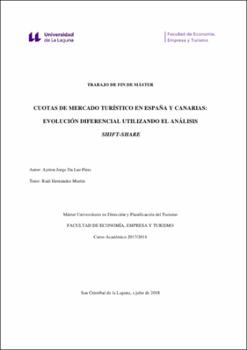Cuotas de mercado turístico en España y Canarias: evolución diferencial utilizando el análisis Shift-Share
Fecha
2018Resumen
The growth of the global tourism market represents for many countries or destinations a great
opportunity to position themselves competitively to attract the greatest number of tourists, who can
positively reflect on the economy and social welfare. This requires understanding the behavior of
each of the issuing markets towards destinations. In this context, Spain and the Canary Islands depend
a lot on the contribution of tourists from twelve European countries, which accounted for more than
77% for Spain and for the Canary Islands, 93%, their weight in the contribution on the total arrival
of international tourists in the 2008 and 2013. This study uses the shift-share technique to better
understand the dynamics of the European tourism issuing markets, providing important information
that can be used to make strategic policy decisions to improve competitive advantages in a tourism
market in constant transformation. El crecimiento del mercado turístico global representa para muchos países o destinos una gran
oportunidad para posicionarse competitivamente para poder atraer el mayor número de turistas, que
puedan reflejarse positivamente en la economía y el bienestar social. Eso requiere comprender el
comportamiento de cada uno de los mercados emisores hacia los destinos. En este contexto, España
y las Islas Canarias dependen muchísimo de la aportación de turistas de doce países europeos, que
representaron para España más del 77% y para Canarias, el 93%, su peso en la contribución sobre el
total de llegada de turistas internacionales en los años 2008 y 2013. Este estudio utiliza la técnica
shift-share como forma de entender mejor la dinámica de los mercados emisores turísticos europeos,
aportando información importante que pueda servir para la toma de decisiones políticas estratégicas
que permitan mejorar las ventajas competitivas en un mercado turístico en constante transformación





